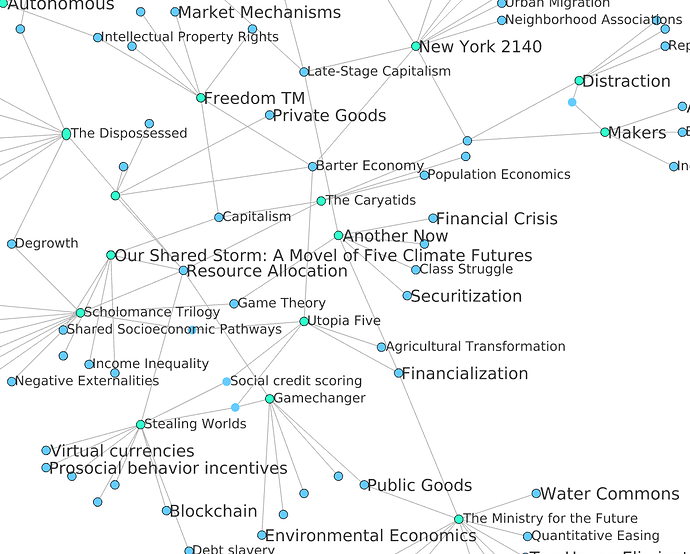Recently I have been adding new material to the Science Fiction Economics wiki here on Edgeryders. It’s becoming quite large and sprawling: at 5,000 words it is already at the point when it needs to become more hypertextual and navigable, at the very least.
But here is the thing: I have the impression that, as it gets bigger, this thing wants to be turned into data. And maybe, given my own academic work, I have a hammer, so i see everything as nails: but I would love to grow this thing a bit more and then look at the network of co-occurring economic concepts and ideas in science fiction. The idea is just another angle on a familiar concept in network science: when you have a bunch of document all tagged with keywords, you can easily induce a network of the keywords.
- The network is undirected and weighted.
- Two keywords are connected by an edge of weight equal to the number of documents in which they bot appear.
The logic here is exactly the same. Keywords are economic concepts; documents are science fiction novels or short stories. For example, irredeemable personal debt figures both in Doctorow’s Walkaway and in Karl Schroeder’s Stealing Worlds. Walkaway (but not Worlds) also has commons-based peer production, and Worlds (but not Walkaway) has smart contracts. Even if we stop here, we have a small network, with takes the shape of a V with irredeemable personal debt at center, linked to both commons-based peer production and smart contracts. Where it starts to get interesting is if we start to see consensus: if, in other words, the same clusters of economic concepts keep reappearing across different works and authors.
What might such a network tell us exactly? At the simplest level, it would give us a map of what, in economic thinking, appeals to the imagination. Squinting at it, an anthropologist might be able to say something about the values, aspirations, and fears around the economy of science fiction authors and, indirectly, readers. It’s at the border between STS and humanities analytics.
Many ways to do it, of course. A fairly unwieldy (but machine-friendly) way is to use our own forum here plus the OpenEthnographer tool: the wiki’s text would become a set of one-post topics, each one dedicated to a specific author. I could then add the keywords with Open Ethnographers and BANG! The network is there.
Any thoughts, anyone? @Kyle ? @petussing? @Nica ? @zazizoma ? @nadia ? Others?
